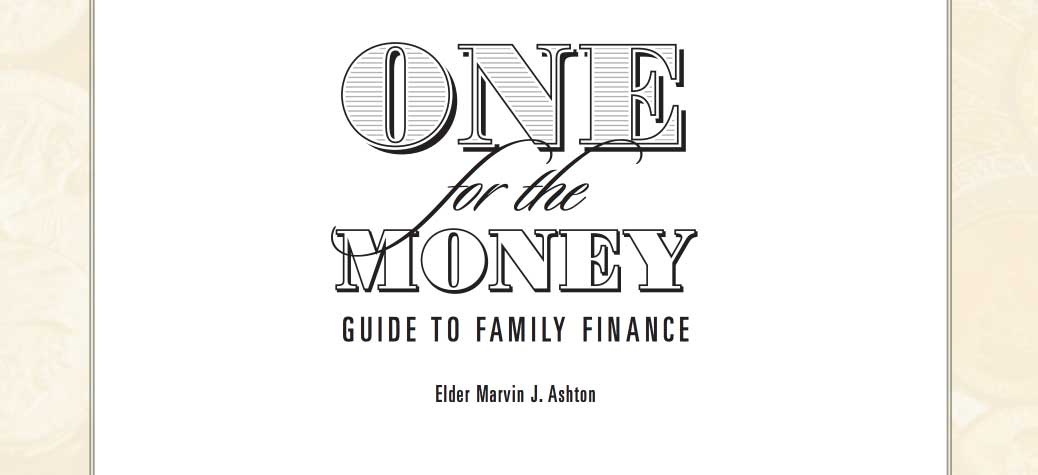One for the Money, Guide to Family Finance
If you want to be successful raising a family, one of the most important skills you can develop is managing your finances. In the 21st Century, being a parent is more expensive than ever. A USDA report released in 2017 estimated that it will cost parents $233,610 to raise a child born in 2015. In a time where a strong marriage is becoming increasingly difficult to find, in large part because of financial problems among married partners, it is even more important to draw upon time-tested principles for staying ahead (or catching up if that’s your current situation) of your money concerns.
When I was newly married, I read a pamphlet produced by my church entitled, One for the Money, Guide to Family Finance, written by Marvin J. Ashton, a devout religious leader and businessman who spent lots of time counseling young couples. The twelve principles outlined here were first introduced during a speech Ashton gave in 1975, but their application is as useful today, if not more so, than when it was given.
I will discuss the twelve principles included in Ashton’s One for the Money speech (which was subsequently made into a PDF pamphlet) below, including sharing my own experiences in trying to abide by these principles.
Because it was presented by a religious leader, this advice is faith-based. My strong personal opinion and experience tells me that strong faith is required to be the most successful and prosperous. However, most of these principles can also be used in strictly secular circumstances as well.
1: Pay an Honest Tithing
It is no coincidence that this principle is first on the list. Those who are not inclined towards religion will naturally be skeptical about giving charitable contributions away from your earnings as a way to become more financially stable, but there is more to this principle than just the math that would involve mere subtraction of funds.
Paying an honest tithing means to contribute 10% (the word tithe means 10%) of your income to God. In my church, we pay 10% of what we personally consider to be our “increase” to the church. That money is used to build new church buildings and to fund the operations of a globally expanding church along with its mission of sharing the gospel.
Those who don’t belong to a church might consider this principle to be an opportunity to open their hearts and be generous to a cause they support as a way of showing gratitude to a higher power. That sense of gratefulness itself opens doors and provides opportunities that wouldn’t be available otherwise.
I have personally seen enough miracles and heard stories of others such that I consider paying a tithe to be a sort of divine insurance program. My payment of one-tenth of my income is the way that I give thanks to God for what has been given to me, thus allowing the “windows of heaven” to be opened and blessings contingent upon my faithfully paying tithing to be poured out upon me and my family.
If you’re intent on getting ahead financially, don’t skip over this principle!
2: Learn to Manage Money Before It Manages You
When a couple is married, into that marriage is brought two often very different backgrounds with respect to managing money. In a worst case scenario, neither of the spouses has experience or is good at managing money. More often, the varying priorities regarding what’s important have to be reconciled in a new marriage relationship. Making that happen and establishing a plan for managing the money of the new entity normally takes work, assertiveness, and discipline.
As a family grows and evolves, habits regarding money also have to mature. As a father of six (with one more on the way), I’ve found that every child added to the mix places an increased financial burden (one I’m happy to shoulder) that requires increased discipline and teamwork to absorb into the family unit.
When my wife and I were newly married, we had no money, and we had a little bit of debt from some small financial misfortunes that had happened just before we were married and right afterward. Each of us came from backgrounds that were meager. Before our wedding and in the months afterward, we sat down and made a plan to take control of our finances. More than 15 years later, we are very glad we took that approach early on in our marriage.
3: Learn Self-Discipline and Self-Restraint in Money Matters
One of the most common problems afflicting modern society is an unrestrained addiction to materialism. Commercials from car dealers, furniture stores, and so many other consumer items constantly tell us that six months financing is the same as cash, that anyone with a job is approved for credit, and convince us that wants should be classified as needs. In church leadership positions I’ve held, I’ve seen people who were asking for church financial assistance classify everything from premium cell phone plans to pet grooming as “needs”. Our society (and marriages collaterally) is paying dearly for this mentality. Household debt is at a record $13.2 trillion as of the first quarter of 2018, with consumer debt (debt for things that are consumed or that don’t appreciate) in the neighborhood of $4 trillion.
A lack of self-discipline and self-restraint is certainly the cause of too many divorces, in addition to the anxiety stress, and sense of bondage it creates for those whose marriages don’t end up failing.
A big part of the challenge of this life is to learn to deny ourselves things that we want naturally, because we can see how indulging in those things will affect us negatively in the long term. In matters of financial management, this principle is paramount.
In his commentary on learning self-discipline and self-restraint in money matters, Ashton suggests that couples demonstrate “genuine maturity” and the unselfishness required for a happy marriage when they prioritize the needs of the family unit over their own natural spending impulses.
4: Use a Budget
Budgeting tends to be a chore for most people. My wife and I have struggled with being consistent budgeters, especially as we’ve increased in wealth and haven’t felt such an urgent need as when we were newlyweds. However, when we are out of the habit of budgeting, we always find ourselves feeling a bit lost, unsure of how much we’re spending and how much we’re saving. Even for those who have already done well financially, maintaining a regular habit of tracking expenses and planning income against expenditures opens communication channels in a marriage relationship and gives empowerment to a couple and their children.
In our technology driven world with millions of applications that do almost everything, there are plenty of computer and mobile apps that can be used to make budgeting easier. In my family, we use the EveryDollar application produced by Dave Ramsey’s organization. It’s free, easy to use, and it’s built with the foundational approach used for Ramsey’s 7 Baby Steps program.
If you aren’t using a budget, make a plan to start right away. You need to know how much money you’re spending on what things and be able to compare that with what income you’re receiving each month if you want to have greater power over your financial future.
5: Teach Family Members Early the Importance of Working and Earning
Kids can learn from an early age the concepts of working for something and being rewarded for their efforts. I’ve seen my kids beginning at younger than two years old regularly acknowledge and appreciate the ability to provide value and contribute to the family.
The term “millenial” (identifying those born between 1982 and 2004) has become somewhat of a pejorative, referencing adults who constantly want things to be given to them instead of earning what they receive. It’s easy to see that many of this latest generation have lost the sense of accountability, which naturally influences too many of them to feel lost and lacking in value. An entitlement demeanor most often comes from kids being spoiled, which teaches them to be takers rather than givers. That mentality is not easily fixed, and often leads to financial destruction.
Kids can and should be taught beginning in their toddler stage and continuing through adulthood that working, contributing, and being rewarded based upon merits are healthy for them. Their parents should be examples to them of loving and enjoying work.
In teaching children to work, it’s important that they learn to appreciate both physical and mental exertion. Earning an allowance can be done by either doing things like chores in the home or completing homework or achieving educational goals. As kids get into their teenage years, it’s helpful for kids to take on summer jobs and/or part-time work during the school year to give them the opportunity to experience what it will be like when they eventually have the responsibility of providing for their own families.
6: Teach Children to Make Money Decisions in Keeping with Their Capacities to Comprehend
I’ve often experienced having one of my little children come to me with some coins he has collected and asking if he can buy a bike or some other object that is much more expensive than what his young mind comprehends. At an early age, kids start to try to piece together the need to have money to pay for things, and they can be given perspective on a small scale starting at a young age.
The One For the Money guide recommends giving kids opportunities to save money for specific purposes that make sense for their stage in life. Saving for a new toy, to contribute to a family trip, and for other purposes helps them connect work hours an effort with the potential rewards that come from it. It also helps them get a sense of how skills and effort factor into a wider economy.
7: Teach Each Family Member to Contribute to the Total Family Welfare
In many family settings, kids are insulated from what it takes to manage the household. While younger kids should certainly not take on the stresses and challenges the parents face with providing for the household, they should understand that there is effort required by their father and mother to provide a comfortable home for them. If a child reaches adulthood thinking that free room and board is a human right, he will be in for a shock when it comes time to fully cut the apron strings. In fact, the trend over the past several decades has led to more adults (people ages 18-34) living at home with their parents than there have been since the 1940s. Some of this trend is attributable to young adults’ lack of ability to earn a living that would allow them to move out on their own.
Children should be taught to contribute money they’ve earned towards a shared family benefit, such as a trip. Ways to help children understand their obligations to their own household and learn how to become givers should be discussed during family council meetings.
8: Make Education a Continuing Process
The One for the Money guide suggests getting as much formal education as possible. Learning, increased income, and better management of money are highly interconnected. In the process of getting education, it is important to consider how to match natural skills and propensities with income earning opportunities in the current and future economy. For instance, the majority of high earning jobs in the modern age involve the use of a computer. Kids and adults should spend time understanding how computers and technology work so that they don’t find themselves left out on earning opportunities they could otherwise have.
One word of caution regarding continuing education involves how to finance it. The higher education system in the United States has become nearly unaffordable for the majority of those who are candidates for obtaining college degrees.
A recent Forbes article that evaluates the cost of obtaining a college degree compared with the benefits it provides explained that wage increases from attending college are losing value because of the dramatically rising cost of a college degree.
There are also many alternatives to college available in the modern era that make it possible to get both informal and formal education without having to spend time on an expensive college campus.
9: Work Toward Home Ownership
Home ownership has long been considered a major part of the American Dream. Although there have been uncertainties in the housing market (the housing bubble of 2008), home ownership is still considered to be an investment as opposed to a consumption expense.
Purchasing a home has become easier as lending institutions have become creative (in many cases irresponsible) about lending to more people, many of whom are in reality unqualified. Becoming a homeowner and paying off your home is a worthy objective. Just make sure you don’t jump the gun and become “house poor” by buying too much too soon.
10: Appropriately Involve Yourself in an Insurance Program
Insurance protects against unexpected losses. Your financial stability can take a beating if you are not adequately insured. Typical insurance concerns that you should address include:
- Medical/Health Insurance
- Automobile Insurance
- Homeowners Insurance
- Life Insurance
Shopping for insurance can be complicated, so it’s a good idea to find an agent you can trust and lean on him or her for advice based on your specific family situation, including as it changes from month to month and year to year. Spending the time and making the effort to find the correct balance between being adequately insured and being over-insured (which happens more often that it should) will allow you to protect your financial standing.
11: Understand the Influence of External Forces on Family Finances and Investments
This principle deals with making sure that you are aware of your financial surroundings and make the best use of your income and investment options that are available. Being wise about concepts like inflation, investment options, interest rates and other aspects of a dynamic economy will help you to make better financial decisions.
I will share with you an example of how this principle has benefitted me. When my wife and I bought our first home together just after finishing college in 2006, it was clear to us that the housing market was unhealthy. We had observed and tracked the speedily increasing prices of homes in our area. We also heard from friends and read about in the news and in advertisements about interest only loans and other practices that we knew were not sustainable. Instead of buying a home for the amount we were pre-approved for (over $400,000 on a $70,000 income), we found a modest home in an area 20 minutes outside of where we really had wanted to live. Four years later, after we’d witnessed the largest housing collapse in history, we bought a larger home for just over half the price it was originally sold for four years before we bought it.
By paying attention to the external forces that could affect us, we were greatly benefitted.
12: Appropriately Involve Yourself in a Food Storage and Emergency Preparedness Program
This principle is another kind of insurance for your family. There is always a possibility that emergencies could arise for your family specifically or in widespread cases throughout your community.
The story of Joseph in Egypt is illustrative. During seven years of plenty, his advice to store food and be prepared was heeded by the Pharaoh, and it ended up saving a nation from starvation.
Experts recommend keeping at least three months worth of food at home, along with a supply of water to last for 14 days. Comprehensive strategies for long-term storage are available online, including this one from the BYU Nutrition, Dietetics & Food Science department.
Being prepared for emergencies has as many aspects to it as there are chances of danger to you or other members of your family, whether from natural disasters, political or economic instability, or any of the other thousands of things that could pose a threat.
A family I met recently moved to the United States two years ago from Venezuela as living conditions began to quickly deteriorate there. Inflation and food shortages, leading to lines that took days to buy even small necessities, made it impractical for them to obtain food. They told me of how grateful they were that they had planned ahead and could rely upon their food storage to see them through until they were able to leave the country.
There are lots of education resources for emergency preparedness topics. The ones I recommend the most are the LDS Church’s emergency preparedness guide and Ready.gov.
Establishing a Financially Sound Family
Following these twelve principles should put your family on a solid foundation financially, which will provide stability for your marriage and a rearing environment for your children that simply cannot be obtained in households that struggle financially because the parents have not been responsible.
If you have experiences regarding these principles, suggestions you’d like to share, or feedback on financial principles for families, feel free to share them with us by commenting here or by interacting with Prosperopedia on one of our social media accounts.







